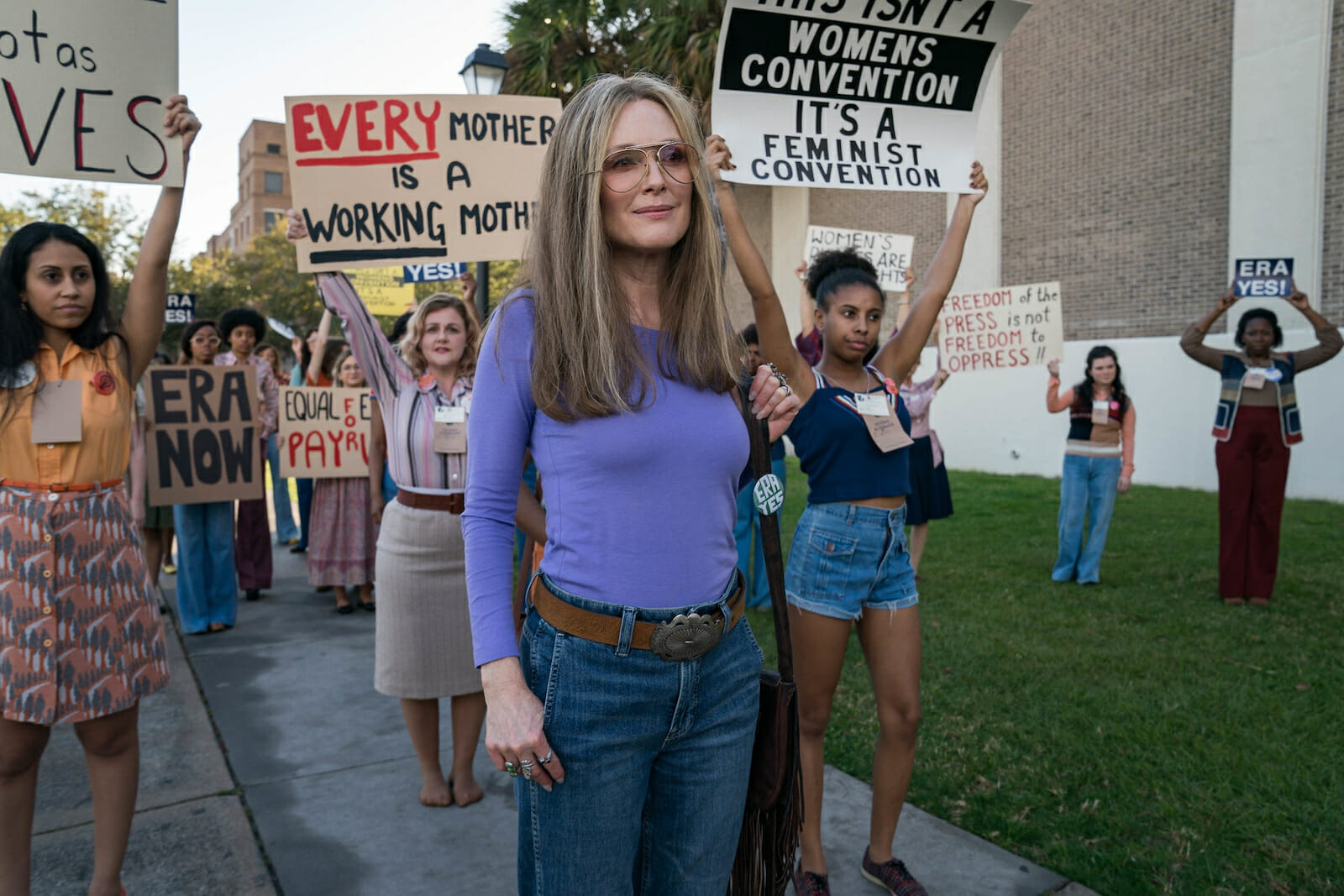
‘The Glorias’ Review
Who hasn’t dreamt of having a conversation with their younger self in hopes of instilling some wisdom to improve any forthcoming life decisions? Writer-director Julie Taymor (Frida, 2002) and co-writer Sarah Ruhl have adapted Gloria Steinem’s autobiography, My Life on the Road, and use cross-country bus trips as a vehicle allowing Ms. Steinem to chat with herself at four different stages of life.
The feminist icon and activist is played by four actors: Oscar winner Julianne Moore, Oscar winner Alicia Vikander, Lulu Wilson (“The Haunting of Hill House”), and Ryan Kiera Armstrong as the youngest Gloria. Childhood is called the formative years for a reason, and we do get a taste of how Gloria’s nomadic hustler of a father Leo (Timothy Hutton), and her mother Ruth (Enid Graham) influence the woman she became. Her father (referring to himself as Steinomite) explained that travel is the best education, while her mother struggled with mental instability after being forced to give up her writing career.
Bucking the male-dominated world began in the era portrayed by Ms. Vikander, and it takes up most of the first half of the film. Discrimination and harassment were commonplace as she fought to be taken seriously as a journalist and writer. This portion includes her trip to India, where she was heavily influenced by the philosophy of Mahatma Gandhi. In addition, we see Gloria’s time as a (undercover) Playboy bunny, and the reactions that her corresponding article caused.
Ms. Moore is on screen for much of the second half, including the founding of Ms. magazine, and her affiliation with other activists like Dorothy Pitman Hughes (Janelle Monae), Flo Kennedy (Lorraine Toussaint), Wilma Mankiller (Kimberly Guerrero, “Seinfeld”), and of course, Bella Abzug (Bette Midler). There’s a moment on the bus when Ms. Moore’s Gloria tells her younger self, Ms. Vikander’s Gloria, “Speaking your mind will get you into trouble.” It sounds like a warning, but in fact, it’s a motivation for what’s to come.
Ms. Taymor’s film cuts between periods of Steinem’s life with the multiple Glorias in action. The bus rides are an interesting choice, as looking out the windows we (and Gloria) sees the streets of New York, the palette of India, miles of nature, and even her own father on the road in his car. Outside is filled with the colors of life, while inside the bus, the colors are muted, often black and white. We see actual clips of the 1963 March on Washington DC, including Mahalia Jackson, and the 1977 National Women’s Conference. It just feels like something’s missing here – like the movie doesn’t have the heft Ms. Steinem deserves.
Sometimes Ms. Taymor’s approach is a bit too artsy for the story, and there is only a brief mention of Ms. Steinem’s nemesis, Phyllis Schlafly, despite much attention to abortion and women’s rights. Gloria’s passion for issues is clear, and we note her motivation to transform an environment that stifled her mother. The film’s music comes from Oscar winner Eric Goldenthal, and the cinematography from Rodrigo Prieto, a frequent collaborator of Martin Scorsese and other elite directors. The timing is spot-on for the film given contemporary issues, including the opening on the Supreme Court created by the passing of Ruth Bader Ginsburg. Despite this, the film might just be a bit too nice, or too lightweight given the history, accomplishments, and impact of Gloria Steinem (who has a cameo appearance on the bus).
The Glorias is available on Amazon Prime.

